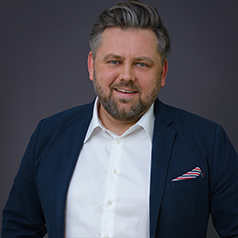

Rafał Kozieł
Doctor of Biology with more than 20-years hands-on professional experience in molecular biology, genetic engineering and biochemistry. M.Sc. degree obtained in 2002 at the Wroclaw University of Technology at the Department of Molecular Biology, Biochemistry and Biotechnology. He received Ph.D. degree in Biochemistry in 2007 at the Nencki Institute of Experimental Biology in Warsaw.
His scientific career focused mostly on mutational investigation of the DNA binding proteins, the role of small compounds inhibiting DNA replication in cancer cells metabolism, cell cycle and viability as well as mitochondrial (pato-)physiology and genetics. In 2008-2012 worked as postdoctoral fellow at the Austrian Academy of Sciences, where he investigated molecular mechanisms of genetic regulation and biochemistry of cancerogenesis, cellular senescence, organismal aging and age-related diseases. In 2012-2017 was employed as professor assistant and lecturer at the University of Innsbruck and the leader of the project investigating the role of NADPH oxidases (NOX’s) in cancerogenesis and in cellular senescence. In the meantime he also participated as visiting research scientist in numerous interdisciplinary projects (Medical University of Vienna, Austria; University of Cologne, Germany, Technical University of Darmstadt, Germany) as well as performed project in collaboration with Estée Lauder (Estée Lauder Research Center, Oevel, Belgium). Dr Koziel published 23 original papers (h-index = 14) in the field of intracellular DNA/RNA processing, non-enzymatic proteins and enzymes activity as well as cellular physiology including cellular signalling pathways, energy-, calcium ions- and intracellular free radicals metabolism.
Since 2017 involved in the drug discovery R&D projects at Oncoarendi Therapeutics S.A. in Warsaw, where he investigated the therapeutic potential of small molecule compound YKL-40 protein inhibitors in preventing human glioblastoma progression, contributed to the identification of new therapeutic targets, led the Cellular Biology Group as well as managed the project of deubiquitinase inhibitors as potential anti-cancer drugs. He co-authored patent application regarding small molecule compounds inhibiting chitinase-3-like-protein 1 (YKL-40). From 2020 co-founder at Biosens Labs Ltd.
